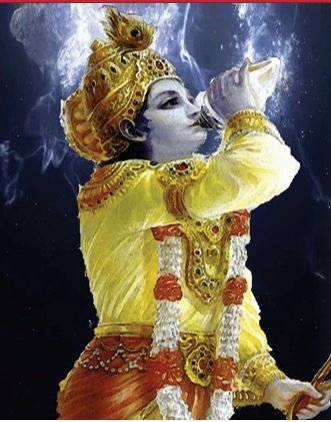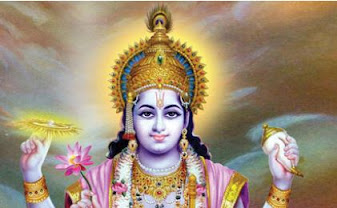Krishna & knowledge of Gita
In Dwapara Yuga, Lord Vishnu incarnated as Shri Krishna on the Ashtami date of Krishna Paksha of Bhadrapada month. Kansa had terror at that time. Shri Krishna killed Kansa. After this, he guided the Pandavas in the war between the Pandavas and the Kauravas. We should learn to keep doing karma from the life of Shri Krishna.
Before the Mahabharata
war, Arjuna had kept weapons. Because, Arjuna did not want to fight a war against Bhishma Pitamah, Dronacharya, Kripacharya. Then Sri Krishna preached the Gita to Arjuna and explained the importance of karma.
Sri Krishna says in the Gita that-
कर्मण्येवाधिकारस्ते मा फलेषु कदाचन।
मा कर्मफलहेतुर्भूर्मा ते सङ्गोऽस्त्वकर्मणि।।
You have the right to act only, but not in its fruits. Because the fruit is in the hands of God. Therefore it is not right to run away from karma nor expect the fruits of karma. These words of Lord Krishna in the Mahabharata period are as important today as they were in those times.
According to this verse,
we should not run away from karma in any situation. Nowadays, most
people think about the fruits they get before doing karma.
When there is no fruit as expected, there is a disappointment. That is why do work, but do not desire fruit. This is the learning of Shri Krishna.
How will the fruit of karma be received, it should be left to God. People who work according to religion, remember God, they surely get success.
Learning of Shri Krishna: We should not run away from karma nor desire the fruits of karma, the fruit is in the hands of God.
Shri Krishna had preached the Gita to Arjuna, by bringing the things mentioned in the Gita to life, many of our problems can be overcome.
Lord Krishna's preaching to Arjuna in the battlefield of Kurukshetra was said to be the knowledge of the Gita. These policies were sung by God, hence it is called Bhagavad Gita. In this, Lord Krishna taught Arjuna, karma and explained what is the cycle of life and death. In the preaching of this Gita, God also showed his great form in God and announced that he is the doer of this creation.
Out of the essence of the knowledge given to Arjuna in God, there is some knowledge that is useful to every human in his personal life at some time or the other. Some of the main ones are…
•Whatever you become in personal life, you are made with your faith, never doubt your ability.
• Krishna has said to Arjuna in the preaching of Gita, fulfil your duties with dedication and labour.
• whatever happened was good. What is happening is good. And, whatever happens, will also be good.
• Perform your duties with integrity and labour.
• You came empty-handed and will go empty-handed. Therefore, be polite to everyone.
•Shri Krishna says to Arjuna that man should subdue all the
senses because the person ,The senses are subdued, its intelligence is fixed.
•Shri Krishna says, do not abandon
the idea of doing Karma, do not think about fame and badness, just do your work.
•It is better to perform one's own duties imperfectly than to master the duties of other.
•If a person constantly thinks about a goal with confidence,
he can become whatever he wants.
•Mind is disturbed and it is difficult to control but if
practiced continuously, you can control the
mind
•Nothing happens in life or nothing is wasted. All our good
and bad deeds sometimes give fruits.
•We are created by our faith, we become what we believe.
•For those who do not control the
mind, their own mind starts
working like an enemy.
•sex, anger and greed are the three gates of hell that
destroy the soul, that is, they are going to be taken into degradation, so
these three should be discarded.
From the flute to the Sudarshan Chakra, every special thing in Krishna's life was gifted to him, he teaches that others should adopt good things.
The entire life of Lord Krishna is ideal from a management perspective. Most of the things related to Shri Krishna's personality, which were a major part of his life, were all gifted to him. All these things are mentioned in texts like Bhagavata, Padmapuran,
Brahmavaivartpuran, Garga Samhita. The relationship of these things is mentioned in different ways in different texts.
Like, flute from Nanda baba, Morepunkh from Radha. These things are the identity of Shri Krishna. They say that wherever a person can get something good, he should take it out in his life. One should learn the good habits of others, take knowledge and respect the things received from loved ones.
Flute-Sri Krishna had received many gifts in his life and most of the gifts were always with him. Nanda Baba gave a flute to small krishna. He always kept this gift of childhood with him.
Life lesson - The flute is hollow inside, but with its sweet voice captivates others. The lesson of the flute is that we should keep our conduct free from evils like ego, greed, anger and speak all sweet.
Vejayanti garland and peacock feather-When Shri Krishna grew up a little, while doing Raslila, Radha presented the Vejayanti Mala and Morpankha (peacock feather) to the Lord. Sri Krishna wears this garland around his neck and in a peacock crown.
Life lesson - Vyjayanti Mala means the winning garland. Its message is that we should remain positive in every situation, only then success and victory prevail. Peacock learns to show respect for nature. Love should be maintained towards all living beings.
Conch(शंख ) and bow-Shri Krishna came to Ujjain, Sandipani's ashram to study. At that time, a monster named Shankhasura had taken the son of the Guru as a prisoner. Sri Krishna freed Guru Putra from the monster. He got conch from Shankhasura. Which is known as Panchajanya. Guru Sandipani presented a bow named Ajitanjaya.
Life lesson- Bow is a symbol of will power. Ajitanjaya means one who is invincible, who also has the ability to win. With will power, we can do any impossible looking work. Panchajanya means the benefactor of five people. We should help those who do the work according to religion.
Sudarshan Chakra-After receiving education, Shri Krishna met Parashurama, an incarnation of Vishnu. Parashurama presented Sudarshan Chakra to Sri Krishna. After this Sudarshan Chakra was always with Shri Krishna. The Sudarshan Chakra was built by Shivji to slay Tripurasura. Later Shiva gave Sudarshan Chakra to Lord Vishnu.
Life lesson - Sudarshan means looking beautiful. Shri krishna had killed many demons, eliminated evils from this Sudarshan Chakra. One should keep his personality beautiful. We will stay away from evils, only then our personality can become beautiful.
Eight names of God
The description of the word Krishna in the Bhagavata is black, along with the word Krishna was also said to be the one who gives salvation.
Lord Krishna has many names. But, there are some names, behind which there is some story, anecdote or a different significance. Separate chanting of such names is also mentioned in the Vidhan Shastras. The glory of the names of Lord Krishna has been told in the Shrimad Bhagavata, Padmapurana, Kurma Purana, Garga Samhita and Brahmavivarta
Purana.
Different texts also have different interpretations of names. For example, in the Bhagavata, the interpretation of the word Krishna is black, but at the same time the word Krishna is also said to be the one who gives salvation. There are two Krishna in Mahabharata, one Lord Krishna, the other is Krishna Dvaipayan Vyasa, the creator of Mahabharata. Ved Vyas was black and was born on the island. So, he was named Krishna Dwaipayana, because of dividing one Veda into four parts, he was named Veda Vyasa.
Many such names of Lord Krishna got due to achievements and characteristics of their personality.
Murari-There was a demon, son of Maharishi Kashyapa and Diti. His name was Mura. Mura conquered heaven with his own strength. Expelled the gods from heaven. Indra then prayed to Lord Krishna. Lord Krishna and his consort Satyabhama killed Mura in battle.Mura being the enemy (Ari) of God,one of the names of God became Murari.
Madhusudan-By killing a demon named Madhu, the god got a name Madhusudan. Gods and humans were also very upset due to this demon. The Bhagavata mentions two to three demons named Madhu, who have occurred in different periods. One of these was slaughtered by Krishna.
Keshav-This name is due to the beautiful hair of God. The description of the form of God is found in the Bhagavata and Garga Samhita. Gopis, Sakhiis and Brijwasis address Lord Krishna in many places as Keshava.
Govardhandhari & Girdhari-Stopping the worship of Indra caused him to worship Govardhan Parvat and then to lift the Govardhan Parvat with the smallest finger of his straight hand to save the people when heavy rain fell on Brij Mandal. God loves both names. In Vrindavan, the name Girdhari, Girirajdhari is used extensively for God.
Madhav-There are two stories behind this name. On one hand, Krishna is named Madhava because of the spring god or the supreme superior of the spring in the seasons, because one of the names of spring is also Madhu. The second story is related to Tretayuga's demon Madhu, who was the king of Mathura. The elder son of this Madhu was Yadavaraj, in whose clan Lord Krishna was later born. He is also called Madhava because he was born in the dynasty of Madhu.
Muralidhar or Vanshidhar- Nand baba gave this name to Krishna because of wearing a flute. Nand baba gifted little Krishna a flute. Which has always been his identity. The flute is connected to Krishna's personality in such a way that the image of Krishna cannot be imagined without him.
Achut ( incredible)-Krishna is unwavering and unwavering in his personality. His image is that of a deity who offers unflinching devotion. He is the only deity who is worshiped together in many forms. People worship Krishna in many ways, including sons, friends, brothers, Gods, husbands, men, warriors, advisors and gurus. He is unwavering in his every form. That is why he has been called Achut.



























